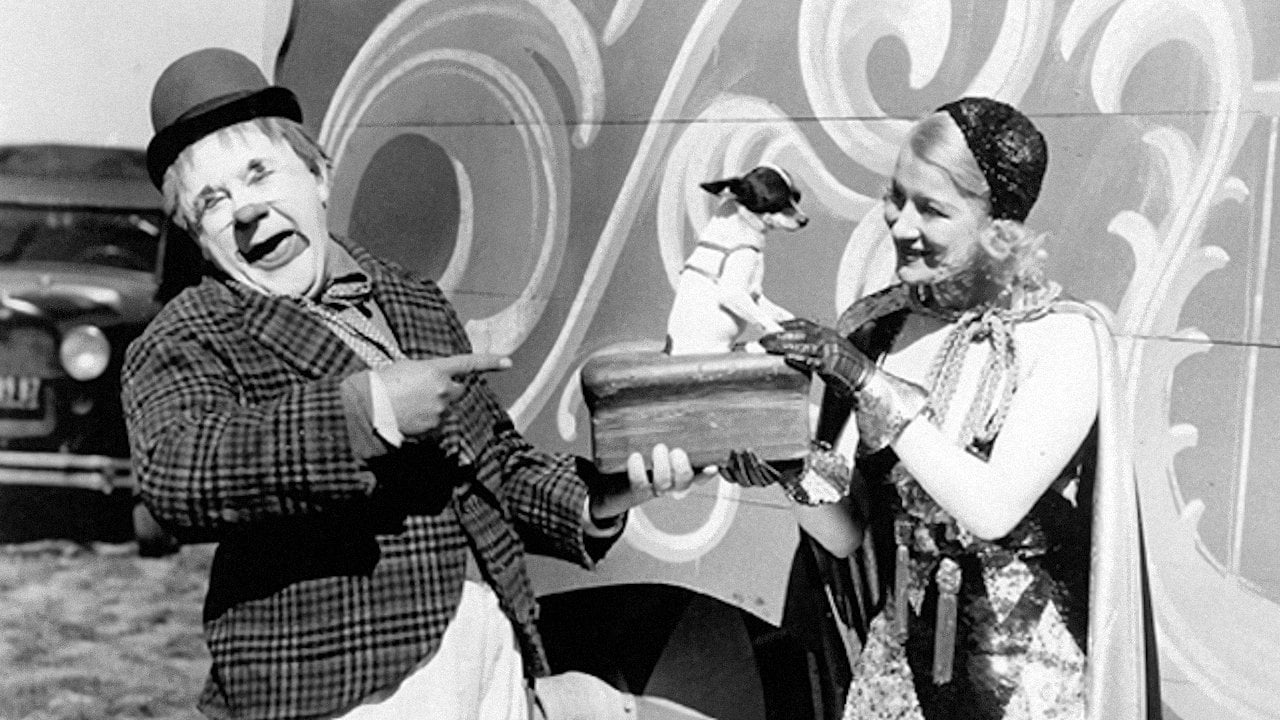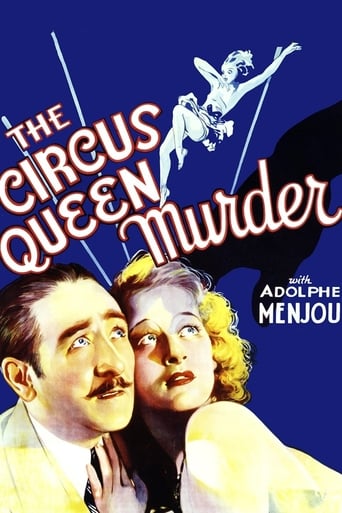WasAnnon
Slow pace in the most part of the movie.
2hotFeature
one of my absolute favorites!
Hadrina
The movie's neither hopeful in contrived ways, nor hopeless in different contrived ways. Somehow it manages to be wonderful
Payno
I think this is a new genre that they're all sort of working their way through it and haven't got all the kinks worked out yet but it's a genre that works for me.
kidboots
This is just a terrific little movie featuring Thatcher Colt, the lip reading D.A. He was a creation of Anthony Abbott, who wrote the stories for Liberty Magazine. Everything about this movie was perfect, the pacing, the wit, the fact that Miss Kelly, his lovely secretary was not just decoration but a vital part of solving the mystery. Ruthelma Stevens also played Miss Kelly in "The Night Club Lady" (1932), the only other Thatcher Colt story adapted for the screen - this movie makes you wish there had been more. Adolph Menjou brought sophistication and urbanity to Thatcher Colt, a harassed New York City D.A. who badly needs a holiday and goes to Gilead, a town where he thinks he can become John Smith.When the circus comes to town all hope of a quiet vacation becomes a dream as he and Miss Kelly are thrown into some seedy circus intrigues. The circus is in strife - it is due to close after it's stay in Gilead due to lack of money, there is also a steamy love triangle involving "King of the High Wire" Sebastian (Donald Cook), Josie La Tour (Greta Nissen) a seductive bare back rider and Flandrin, her deranged husband (Dwight Frye). Yes, that's right, Dwight Frye can add another deranged characterization to his rogue's gallery and he is fantastic.Before he can finish his third bag of peanuts Colt's expertise is needed to help solve the case but he gets a lot of help from Miss Kelly. Flandrin is missing, his caravan is in disarray and there is a gunshot through the window, but while Josie manages to keep a stiff upper lip about that, the death of her little dog Choo Choo sends her into hysterics. There are also threatening letters being sent - "If the circus attempts to open, you will all die!!" - that sort of thing, plus the circus star attraction, a group of cannibals have a habit of going missing. The climatic high wire performance is done very thrillingly and will surprise you!!Greta Nissen was a lovely Norwegian actress whose career never recovered from the "Hell's Angels" debacle. She had already completed her role as the faithless Helen in the silent version but when sound came in Howard Hughes remade the movie featuring his protégé, the unknown Jean Harlow, because Nissen's accent was so hard to understand. Four years later, it wasn't much better - it was still a challenge to understand Miss Nissen in her role of Josie. Strangely, to me, she seemed much clearer in "Transatlantic" made two years previously in 1931.Highly Recommended.
Michael_Elliott
Circus Queen Murder, The (1933) ** 1/2 (out of 4) Rare Columbia mystery was the second film in a two-film series. Police Chief Thatcher Colt (Adolphe Menjou) gets tired of the gangster in NYC so he takes a vacation with his secretary (Ruthelma Stevens) on a vacation. He runs across a friend who owns a circus and decides to stick around when an abusive husband (Dwight Frye) turns up dead. The suspects could be his wife, her lover or perhaps African cannibals. This is a fairly entertaining mystery that works best with its pre-code nature, which at times is fairly ghoulish considering the era that this was made. There's talk of bodies being cut up and fed to lions and there's even a theory that the African cannibals have eaten a victim. Some might be offended by the black folks being called cannibals with their voodoo dolls and skull lying around so be warned there. Menjou and Nissen work well together but it's Frye and Greta Nissen that really steal the show. Donald Cook, best known for his role in The Public Enemy is also good in his supporting role. The actual mystery isn't too hard to solve, which is the film's biggest problem but the 63-minute running time goes by fast. This isn't one of the best of the genre but it's a good time killer.
Neil Doyle
ADOLPHE MENJOU and RUTHELMA STEVENS do a nice job as D.A. and secretary, a sort of Perry Mason and Della Street type of relationship, both of whom are practicing the art of lip reading, which we know is bound to become a plot device in helping to put the murderer away.Menjou is desperately in need of a vacation, so like so many other criminal sleuths before him, he goes to a small town and is soon involved with a circus troupe and a slew of suspects who are trying to kill either the circus queen or her paramour. For an exotic touch, there are traveling cannibals among the circus entertainers.There are a lot of high wire acrobatics and tension as the jealous husband (DWIGHT FRYE) climbs aboard the tent's outside perimeter to peer down at the high wire acts with a crazy gleam in his eyes. GRETA NISSEN is the circus queen (with a thick accent) that Menjou has to keep a sharp eye on.It's a diverting little circus drama, well photographed by Joseph August and directed at a fast clip by Roy William Neill.
bensonj
This is the second film (in a mini-series of two) featuring Menjou as Thatcher Colt, Police Commissioner, the first being THE NIGHT CLUB LADY. They're both extremely well made and quite entertaining, a very diverting double. And well written: based on novels by Fulton Oursler, they have screenplays by Capra regulars Robert Riskin (the first) and Jo Swerling (this one). The similarities of the two films are many. In each, the character (and actor Menjou) shows off his language skills. In NIGHT CLUB LADY, each suspect is a different nationality, and Menjou plays a long scene on the phone in lightning French. Here, he overhears a conversation in German with Nisson (whose first language that was). In both, the time and place of the impending murder of the title lady is known, and Colt arrives in plenty of time with a large retinue of police, but is still unable to prevent the crime (a funny sort of hero). In both, the method of the murder is exotic, and in both Colt puts himself at risk, wearing a secret protective vest, to catch the murderer. In both, he has a personal side-kick named Kelly who handles all the important details, nicely played by Ruthelma Stevens (probably her largest film roles). His relationship with her is ambiguous. In the first film, he is constantly surprised in apparently compromising situations with her (actually demonstrating a wrestling hold or the murderer's method) which he blithely declines to explain. In the second, she is traveling with him on his vacation, and at the end, when she's in danger, he says that she's the only person he really cares about in the world. Their somewhat equivocal relationship is only one of the many little pleasures in the two films. But there are also many significant differences. NIGHT CLUB LADY is a whodunit with many equally guilty suspects; and whenever one begins to look more guilty, "you know who" gets killed. In this one, one more-or-less knows who the murderer is, and the tension is in whether he will be caught in time (in a ridiculously extended big-top sequence that cuts--and cuts--back and forth from the murderer, intended victim, police, spectators, etc.). In the first, the victim is rather unpleasant, and is killed off early, but here the victim is sympathetic and is killed near the end, a real plot flaw. The style of direction is even more dramatically different. The first is generally rather lighthearted, with an alcoholic Skeets Gallagher constantly interjecting humorous comments. It's brightly lit and takes place in posh surroundings. CIRCUS QUEEN is atmospheric, with heavy drama driving the plot. The circus ambiance is moody and dark, and the eerie growls and cries of the wild animals are used like soundtrack music for the night scenes with impressively unsettling results. For me, this effective development of atmosphere gives this film a slight edge over the first in the series. Needless to say, the two films had different directors. This one was directed by Roy William Neill, who also turned in the creepy, nearly unknown BLACK MOON the following year. Like most other Columbia films of the pre-Code era, this double has no reputation simply because they are virtually totally unavailable. What a shame!

